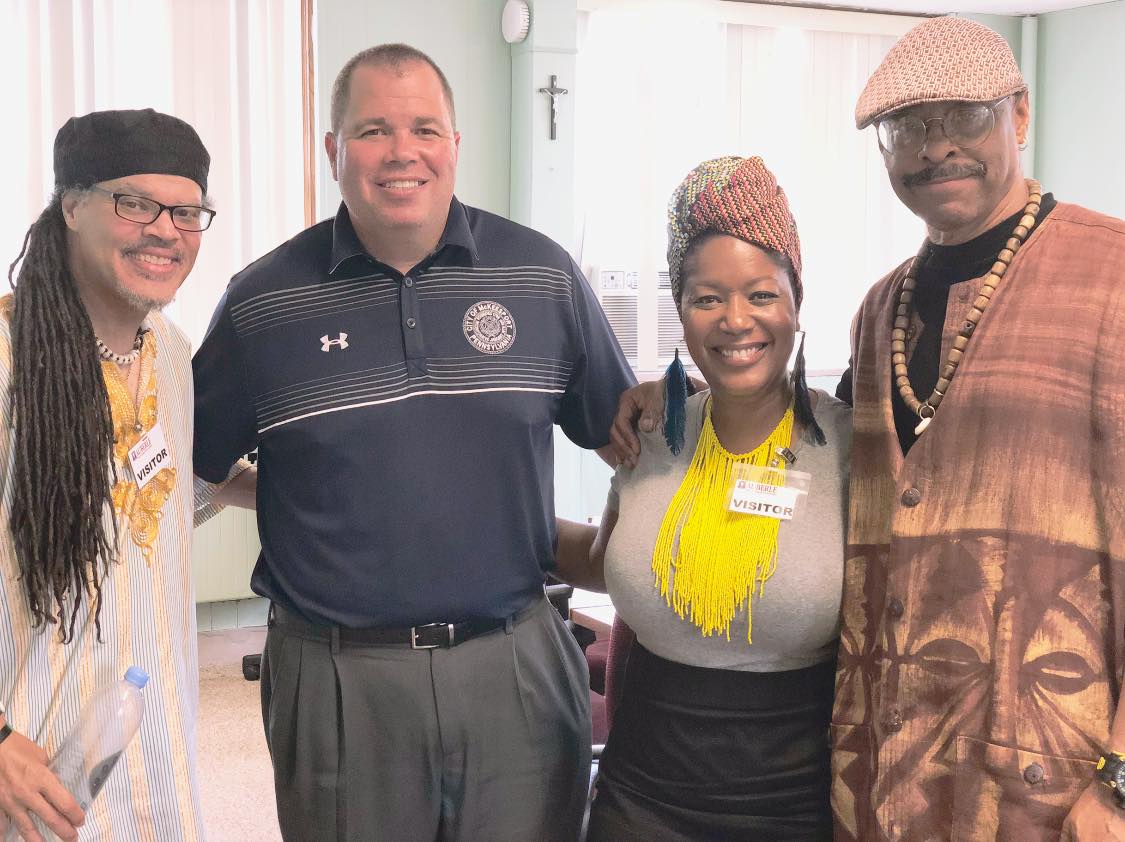(Advertisement)
Tube City Community Media Inc. is seeking freelance writers to help cover city council, news and feature stories in McKeesport, Duquesne, White Oak and the neighboring communities. High school and college students seeking work experience are encouraged to apply; we are willing to work with students who need credit toward class assignments. Please send cover letter, resume, two writing samples and the name of a reference (an employer, supervisor, teacher, etc. -- not a relative) to tubecitytiger@gmail.com.
Ads start at $1 per day, minimum seven days.
Violence Leaves City Grieving, Looking for Answers
Educators, community leaders say moment must be met with collective efforts
By Adam Reinherz
The Tube City Almanac
February 27, 2023
Posted in: McKeesport and Region News
SPECIAL REPORT — © 2023 Tube City Community Media Inc.

(WCN247.com photo via Flickr, licensed under CC BY-NC-ND 2.0)
After a violent three-month period that has seen three young people shot — one fatally — as well as the murder of a police officer, McKeesport residents are searching for answers.
“This was not how we grew up at all,” McKeesport Area School Superintendent Tia Wanzo said in an interview. “We went through 13 years of school and we may have had one student in our class that passed away — whether it was a car accident or something unexpected — but this is way too much. It’s too common.”
The events, she and other community members said, evidence new realities.
Wanzo recalled her actions following the Dec. 13 death of 16-year-old Chance Naylor. In the aftermath of the student’s murder, she began preparing a statement.
Parents and educators are frustrated, concerned
Wanzo searched her records, found text about a previous student death and crafted a response based on familiar language.
The process was distressing, Wanzo said. “Why do I have a file of letters that have these words in them?” she remembered asking herself.
The answer is that work necessitates possession of such materials. Leading a district also requires keeping abreast of safety strategies, lockdown drills and trauma management.
Wanzo knows parents are frustrated and concerned.
“We’ve had three shootings within six weeks. Those were all three kids that went to this school and we’ve lost one,” White Oak resident Stephanie Graham said during a January school board meeting. “I don’t know what else I can say. I hope nothing happens where we lose any kids on site.”
The meeting was held before the Feb. 6 incident — less than a half-mile from the high school — when McKeesport police Officer Sean Sluganski was killed and fellow Officer Charles Thomas Jr. was wounded. The school campus was on lockdown following the incident. A 31-year-old city man is charged with murder and attempted homicide in the shootings.
The superintendent communicates regularly with parents and teachers through texts, phone calls and meetings. As a parent herself, Wanzo understands the disquietude. She also sees the toll the violence is taking on her staff.
“They've had to become a lot more for students than just their teacher,” she said. “They could be their mom on some days, their guidance counselor or social worker.”
Serving manifold roles doesn’t negate the initial requirement, she said: “They still have to teach and keep things as normal as possible.”

(James from Adelaide photo via Flickr, licensed under CC BY 2.0)
Minister: Pittsburgh region ‘trending in the wrong direction’
But what happens when normalcy is an unstable state?
McKeesport has 17,727 residents, according to the 2020 U.S. census. According to University of Pittsburgh researchers, the city averaged six homicides per year between 2016 and 2021.
Given McKeesport’s population, the sum is startling.
“I believe we’ve entered a new era,” Rev. Paul Abernathy said. “If you compare the kind of violence that we’re seeing now in our region to violence in the past, we will see that we are trending in the wrong direction.”
Abernathy, an Antiochian Orthodox Christian priest, heads the Neighborhood Resilience Project, a Pittsburgh-based ministry.
Since creating the organization seven years ago, Abernathy has partnered with local universities and researchers to create a trauma assessment and response toolkit.
He said three questions typically identify whether trauma is “so widespread that it actually serves a foundation for a community’s worldview.”
Three questions identify when community is traumatized
Those questions are:
1. Have people either lost a son to gun violence or know someone who has?
2. Have people been incarcerated or know someone who has?
3. Have people experienced eviction or do they know someone who has?
If the answers to those questions are yes, across the board, then the level of trauma is “so extensive that it goes beyond the direct experience of the individual and is now impacting culture and environment,” he said.
When trauma reaches this state, Abernathy said, “we have young people who believe that the only thing they can do is carry a gun to keep themselves safe.”
Easy access to firearms is one problem, but the lack of a regional development plan is another, he said.
A 2016 report from the Pittsburgh Fair Development Action Group concluded that thousands of residents of City of Pittsburgh neighborhoods such as East Liberty, the North Side and Point Breeze were losing their homes due to rent increases, new development and replacement of affordable housing — such as Penn Plaza — with luxury apartments.
Some of those displaced have wound up in places such as McKeesport, Duquesne and other Mon Valley communities.
When “hundreds of people are moved into the Mon Valley without any planning around how that impacts communities,” a negative result is likely to occur, Abernathy said.
Murphy: Some students are afraid to walk to school
Keith Murphy similarly claimed a lack of regional strategy is harming McKeesport children.
Murphy heads the Healthy Village Learning Institute, a wellness center promoting youth development, education and the arts. He pointed to comprehensive plans from the district and said greater specificity must be made.
“We want to increase student achievement by 20 percent. We want to reduce truancy by 20 percent in two years,” he said. “But if you have no goal to strive for then you are doing the status quo.”
Murphy said the district’s results are disappointing.
Despite a statewide attendance average of 82.2 percent, only 52.9 percent of students at McKeesport Area Senior High School maintained regular attendance during the 2020-2021 school year, according to Future Ready PA, an index compiled by the Pennsylvania Department of Education.
Similar data from the same period reveals that only 30.2 percent of McKeesport Area Senior High School students are proficient or advanced in English Language Arts and Literature; 36.8 percent are proficient or advanced in Mathematics and Algebra; and only 21.8 percent are proficient or advanced in Science and Biology.
Murphy said the Healthy Village Learning Institute and other community partners are eager to help, but the recent wave of violence is further traumatizing children who are already experiencing educational hardship and communal duress.
“What's happening now is there's a lot of kids, who frankly are afraid of walking to this place because this violence has been happening two to four blocks away from us,” he said.

From left, Keith Murphy, McKeesport Mayor Michael Cherepko and Los Angeles-based educators Angelina Arrington and Darnell Bell following an anti-violence workshop with young people at Auberle in June 2019. The workshop was funded in part by the state Commission on Crime and Delinquency in support of McKeesport's Gun Violence Reduction Project. (File photo, submitted courtesy City of McKeesport)
‘We don’t know what we don’t know’
Murphy regularly attends district school board meetings, and said he’s heard about responses to the recent violence but would like to know more from the district about its approach to trauma.
“There are members in the community that are trying to save these kids. But what we don’t know we don’t know,” he said. “If they got the silver bullet and the silver bullet is not working, we still got werewolves.”
Past president of the school board Mindy Lundberg said the district must remain focused on its students.
“We know that our kids have been through a lot with the pandemic, and the lack of social interactions, the loss of educational opportunities, and then the violence on top of it and the trauma that brings. It’s heartbreaking truthfully,” she said.
Educators must realize students’ realities. There are children who “live in a community or visit areas where they may not feel safe, or go home to areas where they may not feel safe,” she said. “It's really important for schools to understand our students, what their struggles are, and then work collaboratively to try to figure out a way to support them the best way that we can.”
Community members visit schools, students
Lundberg credited Wanzo with being proactive and reactive to the recent violence.
The superintendent said that following the shootings, the school’s special education director met with social workers, guidance counselors and school psychologists to create a plan for increasing accessibility to students.
Wanzo also noted that as part of the district’s diversity, equity and inclusion work, a group of nearly 30 community members now visit the schools on a regular basis.
“They are just there for the students to talk to, to be a presence, nothing formal,” she said of the group.
The parents, religious figures and local activists who are part of this core are key to ensuring student success, Lundberg said.
“Many of the community members that are involved are well known. They know many of our students. They look like a lot of our students. They live in the same communities as our students, so they really have that ability to relate and interact,” she said.
Though it’s beneficial utilizing outside resources, Lundberg continued, there’s “certainly something to say from having the community come together to support the students.”
Expert: Use this moment to mobilize
Abernathy agreed, and said the recent violence has “transpired on the eve of an unprecedented opportunity.” McKeesport residents must use this moment to “mobilize significant resources to address the conditions that are fueling this violence.”
Abernathy cited a Jan. 11 announcement that the Pennsylvania Commission on Crime and Delinquency awarded $100 million in grants to 127 projects implementing local and regional strategies to reduce gun and group violence in Pennsylvania.
Last year, the Healthy Village Learning Institute was awarded a $150,000 grant (also from PCCD) to support an “intensive community outreach process.”
During eight years in office, the Wolf administration committed $355 million toward combating gun violence in the Commonwealth.
Abernathy said McKeesport residents must ensure statewide funding addresses local concerns:
“This is a time for the people of McKeesport, the citizens of McKeesport, to recognize that with their leadership and participation, these committed resources can be leveraged in a way that go beyond simply taking guns out of the hands of children, but even go so far as to create real sustainable change that the people of McKeesport can taste and see.”
Only then, he said, can the residents of McKeesport “essentially experience community in a resilient healthy way.”
Adam Reinherz is a freelance writer. He can be reached at adam.reinherz@gmail.com
Originally published February 27, 2023.
In other news:
"NAMI McKeesport Sets …" || "City Man Held in Stri…"
 TM
TM